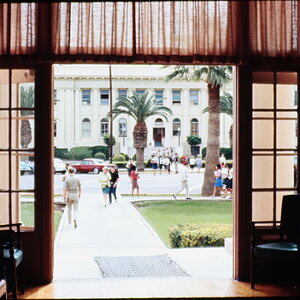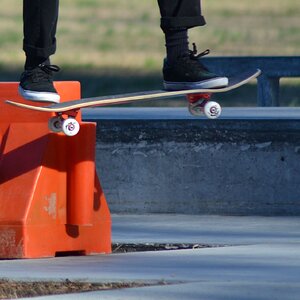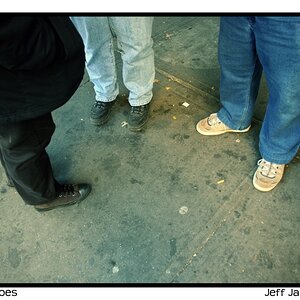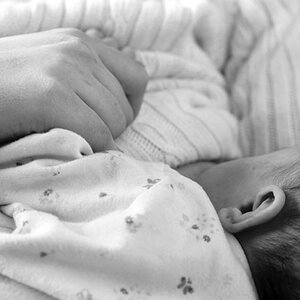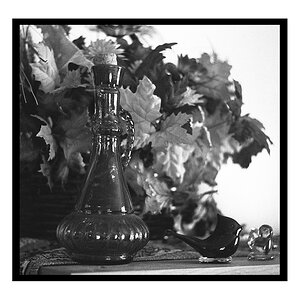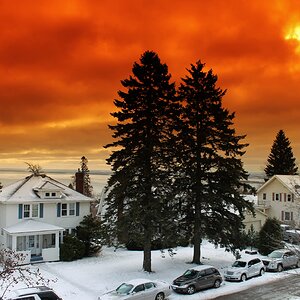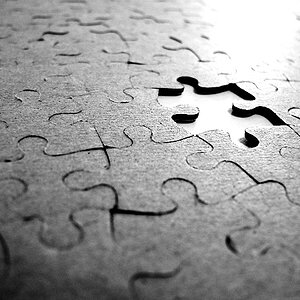Navigation
Install the app
How to install the app on iOS
Follow along with the video below to see how to install our site as a web app on your home screen.

Note: This feature currently requires accessing the site using the built-in Safari browser.
More options
You are using an out of date browser. It may not display this or other websites correctly.
You should upgrade or use an alternative browser.
You should upgrade or use an alternative browser.
patrickt
TPF Noob!
- Joined
- Sep 22, 2007
- Messages
- 317
- Reaction score
- 3
- Location
- Oaxaca, Mexico
- Can others edit my Photos
- Photos OK to edit
Photography is healthier than Newsweek.
THORHAMMER
No longer a newbie, moving up!
- Joined
- Dec 24, 2005
- Messages
- 2,789
- Reaction score
- 8
I think the title is misleading. It really should say
"Are photography's roots dead" to which of course the author answers its own question in the first paragraph by listing the activities and galleries active today. (how dumb)
the analogy the author uses is way off,
there arent many professional, or wedding, or commercial sculptors.
Of course its going to evolve faster, people do it for money as well as art.
You still have to have a good eye to make a good photograph, no amount of technology will help you there. Just as a band has to have a good ear for what harmonizes well..
"Are photography's roots dead" to which of course the author answers its own question in the first paragraph by listing the activities and galleries active today. (how dumb)
the analogy the author uses is way off,
there arent many professional, or wedding, or commercial sculptors.
Of course its going to evolve faster, people do it for money as well as art.
You still have to have a good eye to make a good photograph, no amount of technology will help you there. Just as a band has to have a good ear for what harmonizes well..
fairphotog
TPF Noob!
- Joined
- Dec 8, 2007
- Messages
- 4
- Reaction score
- 0
- Can others edit my Photos
- Photos OK to edit
This article devalues photography as an art in the eyes of the average reader of newsweek.
I think photography did not "loose its soul," but articles like this can influence avg joe's opinion about photography and have the effect of doing exactly what the article is critisizing!
MB
I think photography did not "loose its soul," but articles like this can influence avg joe's opinion about photography and have the effect of doing exactly what the article is critisizing!
MB
droyz2000
TPF Noob!
- Joined
- Jun 17, 2006
- Messages
- 304
- Reaction score
- 0
- Location
- Buffalo, NY
- Can others edit my Photos
- Photos NOT OK to edit
I do not have a problem with photo editing. What I have a problem with is that a lot of people now instead of using good technique will take a crappy picture and say "oh, I will photoshop it to how i want it to look." I kind of feel that photoshop has made a lot of photographers lazy. I would guess that most people on this forum have had some kind of experience with film. I am 23 and I have used film quite a bit. And I would say that a lot of people have used their experiences with film in their digital photographs as well. What I think the author is touching on is that in generations to come, the care of taking a well exposed, color balanced, picture may become something of the past because photoshop is there to fix it. I realize that photoshop cannot fix everything, but to a lot of people view photoshop as the cure all to bad photography. I do not think that photoshopped pictures are any less art but a lot of times art is not classified by the final outcome as it is the process the artist took to get to the final outcome.
TheLostPhotographer
TPF Noob!
- Joined
- Jun 27, 2007
- Messages
- 128
- Reaction score
- 0
- Location
- A Magical City
- Website
- www.thelostphotographer.co.uk
An interesting article. I pretty much agree with what the writer is saying. It's what I've been saying (far less eloquently) for a few years now and the very reason I will continue to use film when shooting seriously.
Even the most skillfully manipulated images lose their bite. Maybe in another 10 years from now technology and software will be even better with results that mimic reality so well that to the human eye there is no perceivable difference. When that happens we won't trust any printed image we see as a true representation of a reality. Photography will well and truly have lost any veracity it still had with film. Even the best manipulated negatives can be easily verified. Film will remain the preferred medium of choice for many photographers simply for this reason and collectors, historians, the legal world, documentary makers and artists like myself who see the 'reality' of photography as it's essential essence will value film much more and digital far less. They are Two very different media. Those with little interest in photography will probably distrust every image they see regardless, or simply believe everything they're told to believe.
The truth is rapidly becoming a rare commodity.
Photography is finally escaping any dependence on what is in front of a lens, but it comes at the price of its special claim on a viewer's attention as "evidence" rooted in reality.
Even the most skillfully manipulated images lose their bite. Maybe in another 10 years from now technology and software will be even better with results that mimic reality so well that to the human eye there is no perceivable difference. When that happens we won't trust any printed image we see as a true representation of a reality. Photography will well and truly have lost any veracity it still had with film. Even the best manipulated negatives can be easily verified. Film will remain the preferred medium of choice for many photographers simply for this reason and collectors, historians, the legal world, documentary makers and artists like myself who see the 'reality' of photography as it's essential essence will value film much more and digital far less. They are Two very different media. Those with little interest in photography will probably distrust every image they see regardless, or simply believe everything they're told to believe.
The truth is rapidly becoming a rare commodity.
skieur
TPF Noob!
- Joined
- May 14, 2007
- Messages
- 5,071
- Reaction score
- 204
- Location
- Canada
- Can others edit my Photos
- Photos OK to edit
I do not have a problem with photo editing. What I have a problem with is that a lot of people now instead of using good technique will take a crappy picture and say "oh, I will photoshop it to how i want it to look." I kind of feel that photoshop has made a lot of photographers lazy. I would guess that most people on this forum have had some kind of experience with film. I am 23 and I have used film quite a bit. And I would say that a lot of people have used their experiences with film in their digital photographs as well. What I think the author is touching on is that in generations to come, the care of taking a well exposed, color balanced, picture may become something of the past because photoshop is there to fix it. I realize that photoshop cannot fix everything, but to a lot of people view photoshop as the cure all to bad photography. I do not think that photoshopped pictures are any less art but a lot of times art is not classified by the final outcome as it is the process the artist took to get to the final outcome.
I have seen this view before and it is totally ridiculous and laughable.


Postprocessing is a necessary part of the process of taking a photo, it is NOT just for correcting shooting problems. It can bring out detail, correct colour deficiencies in the digital process and highlight a centre of interest. However postprocessing comes at a cost. Some approaches are better than others and the order of processes is important to the amount of picture noise or photo degradation that is the byproduct.
A lot of beginner Photoshopping results in a lower quality image because it is done in a "sloppy, disorganized" fashion because of lack of knowledge and inexperience. Photoshopping is definitely NOT the fix-all for poor photography. It can make photos worse, if badly done.
On the other side of the coin however, excellent quality Photoshopping skills absolutely REQUIRE and DEMAND excellent photographic skills. After all, how can you start to improve or correct a photographic image in Photoshop without recognizing what the problems are? To correct picture noise, you need to recognize that it exists in the image. To recognize whether an edit is sufficiently subtle or over-the-top requires a photographic eye too.
The concept that any so-called "lazy" photographer would willing spend 10 minutes less time taking a photo in order to spend 30 minutes more time trying to correct it to a minimum satisfactory level of quality on the computer is absolutely SILLY.







skieur
Helen B
TPF Noob!
- Joined
- Sep 16, 2007
- Messages
- 3,296
- Reaction score
- 467
- Location
- Hell's Kitchen, New York
- Can others edit my Photos
- Photos NOT OK to edit
"It's art, but is it photography?"
That twist on the worn-out question of whether photography is an art was Richard B Woodward's reaction to Cindy Sherman's work. (Link to original article)
In 1988.
The thing about photography that really grabbed me was the connection with simple, quietly strange reality. That still represents the special essence of photography for me. Something that other visual arts do not have. Nothing spectacular, nothing that shouted. Quiet whispers of "This is how it is. Look carefully."
As Francis Bacon famously wrote: "The contemplation of things as they are, without error or confusion, without substitution or imposture, is in itself a nobler thing than a whole harvest of invention."
Best,
Helen
That twist on the worn-out question of whether photography is an art was Richard B Woodward's reaction to Cindy Sherman's work. (Link to original article)
In 1988.
The thing about photography that really grabbed me was the connection with simple, quietly strange reality. That still represents the special essence of photography for me. Something that other visual arts do not have. Nothing spectacular, nothing that shouted. Quiet whispers of "This is how it is. Look carefully."
As Francis Bacon famously wrote: "The contemplation of things as they are, without error or confusion, without substitution or imposture, is in itself a nobler thing than a whole harvest of invention."
Best,
Helen
Battou
TPF junkie!
- Joined
- May 10, 2007
- Messages
- 8,047
- Reaction score
- 66
- Location
- Slapamonkey, New York
- Website
- www.photo-lucidity.com
- Can others edit my Photos
- Photos NOT OK to edit
I do not have a problem with photo editing. What I have a problem with is that a lot of people now instead of using good technique will take a crappy picture and say "oh, I will photoshop it to how i want it to look." I kind of feel that photoshop has made a lot of photographers lazy. I would guess that most people on this forum have had some kind of experience with film. I am 23 and I have used film quite a bit. And I would say that a lot of people have used their experiences with film in their digital photographs as well. What I think the author is touching on is that in generations to come, the care of taking a well exposed, color balanced, picture may become something of the past because photoshop is there to fix it. I realize that photoshop cannot fix everything, but to a lot of people view photoshop as the cure all to bad photography. I do not think that photoshopped pictures are any less art but a lot of times art is not classified by the final outcome as it is the process the artist took to get to the final outcome.
I have seen this view before and it is totally ridiculous and laughable.
Postprocessing is a necessary part of the process of taking a photo, it is NOT just for correcting shooting problems. It can bring out detail, correct colour deficiencies in the digital process and highlight a centre of interest. However postprocessing comes at a cost. Some approaches are better than others and the order of processes is important to the amount of picture noise or photo degradation that is the byproduct.
A lot of beginner Photoshopping results in a lower quality image because it is done in a "sloppy, disorganized" fashion because of lack of knowledge and inexperience. Photoshopping is definitely NOT the fix-all for poor photography. It can make photos worse, if badly done.
On the other side of the coin however, excellent quality Photoshopping skills absolutely REQUIRE and DEMAND excellent photographic skills. After all, how can you start to improve or correct a photographic image in Photoshop without recognizing what the problems are? To correct picture noise, you need to recognize that it exists in the image. To recognize whether an edit is sufficiently subtle or over-the-top requires a photographic eye too.
The concept that any so-called "lazy" photographer would willing spend 10 minutes less time taking a photo in order to spend 30 minutes more time trying to correct it to a minimum satisfactory level of quality on the computer is absolutely SILLY.
skieur
Suddenly I am reminded of this thread http://thephotoforum.com/forum/showthread.php?t=93522
The concept of snap it now shop it later is not the primary focus of the article, It is the artistic representation and inturpritation of photography that they refer to. The beautiful sunrise over the beach photo is being over looked in favor of mermaids on rocks, HDR and the like as the art form.
So my question to the two of you is this, Are you trying to say that every image that has been photoshopped is being misconstrued as artiscically relevant?
droyz2000
TPF Noob!
- Joined
- Jun 17, 2006
- Messages
- 304
- Reaction score
- 0
- Location
- Buffalo, NY
- Can others edit my Photos
- Photos NOT OK to edit
So my question to the two of you is this, Are you trying to say that every image that has been photoshopped is being misconstrued as artiscically relevant?
No that is not what I am trying to say. I realize that communicating in writing is what it could be so I will blame that on the confusion of what I have written.
I know that P.P. is a necessary part of photography and I do some P.P. What I was touching on is the casual photographer that does not take an interest in learning how to properly use the camera and the elements around them. I have friends who I would consider quality graphic designers and they like photography but only casually. They would much rather spend 30 min in P.S. instead of spending 5 min setting up a shot properly. They will set a camera to auto everything and let their other skills do the rest. Now, their photoshopping skills are an art but I think that because they change a photograph SO much that they have crossed a line, in my mind. That line separates photography and digital imaging. I am not saying what they do is not an art, I am just not sure what they do is photography in its purest form.
skieur
TPF Noob!
- Joined
- May 14, 2007
- Messages
- 5,071
- Reaction score
- 204
- Location
- Canada
- Can others edit my Photos
- Photos OK to edit
No that is not what I am trying to say. I realize that communicating in writing is what it could be so I will blame that on the confusion of what I have written.
I know that P.P. is a necessary part of photography and I do some P.P. What I was touching on is the casual photographer that does not take an interest in learning how to properly use the camera and the elements around them. I have friends who I would consider quality graphic designers and they like photography but only casually. They would much rather spend 30 min in P.S. instead of spending 5 min setting up a shot properly. They will set a camera to auto everything and let their other skills do the rest. Now, their photoshopping skills are an art but I think that because they change a photograph SO much that they have crossed a line, in my mind. That line separates photography and digital imaging. I am not saying what they do is not an art, I am just not sure what they do is photography in its purest form.
I think your initial point in a previous post was somewhat deceptive. You were not really talking about lazy photographers but rather graphic designers that make casual use of a camera in their work. Their expertise is in front of a computer and their use of photography is only functional in nature.
Photography is and has always been "representational". It's relationship to reality is and has always been tenuous at best. Every method a photographer uses behind or in front of the camera, before or after the shot distorts reality. There is no line between photography and digital imaging since distinguishing between levels of "representation" is impossible and irrelevant. Is taking a photo of a digital image photography? How about virtual photography?....using a virtual camera to take a photo of a created image?
Technology has broadened the definition of photography and completely blurred and destroyed any so-called "lines" between photography and "imaging".
skieur
luis_relampago
TPF Noob!
- Joined
- Oct 29, 2007
- Messages
- 54
- Reaction score
- 0
- Location
- Houston
- Website
- www.topimage.vze.com
- Can others edit my Photos
- Photos NOT OK to edit
What's art? who has the right answer? Art is an expression of our feelings regardless if is digital or film, the final out come it's a reflection of our thoughts and feelings, our sensibility as a proposition or a concept, It's up to
each individual who is looking at the image to decide if is art or not.
I don't think photography it's death it's just evolving to a different era.
each individual who is looking at the image to decide if is art or not.
I don't think photography it's death it's just evolving to a different era.
TheLostPhotographer
TPF Noob!
- Joined
- Jun 27, 2007
- Messages
- 128
- Reaction score
- 0
- Location
- A Magical City
- Website
- www.thelostphotographer.co.uk
..
Photography is and has always been "representational". It's relationship to reality is and has always been tenuous at best...
Whilst I agree with your main argument I think the 'continuous' relationship between light and photographer with film is the 'truth'. The negative offers a tangible evidence of sorts, whereas with digital the light is immediately turned into a series of electronic numbers that are vulnerable to corruption. For myself, that is the fundamental flaw in all digital technologies as far as the truth is concerned.
Of course we all perceive the world from our own view point and make conscious decisions about editing light to present a 'reality' and that is often used to create images that distort the reality, but as far as the hardware used is concerned, film offers a more substantial reality than digital.
There are few points in the article I don't agree with. However, the last point the writer makes about photographers having to look for a new way to portray reality I don't agree with. I think it's fine to look at the past and use the old ways.
Skelly
TPF Noob!
- Joined
- Nov 30, 2007
- Messages
- 14
- Reaction score
- 0
- Location
- Salem, CT
- Can others edit my Photos
- Photos NOT OK to edit
I'll admit that I am still quite new to photography but for my dollar and my time the experience of 35mm is the way to go. I can't delete the 'bad' photos and since I don't/can't develop my own film I have to do my best to get something good with what I have right then. I had some trigger time on a 20D at my last job and loved it but I kind of like not truly knowing what I've captured until I pick up my prints. It's like opening a present. It does make "the one that got away" a little more painful but for me the bitter makes the sweet more so.
Of course I'm not trying to make money, make a deadline or please a customer (yet).
Of course I'm not trying to make money, make a deadline or please a customer (yet).
Joves
No longer a newbie, moving up!
- Joined
- Dec 14, 2007
- Messages
- 2,400
- Reaction score
- 22
- Location
- Flagstaff/Az
- Website
- joves.smugmug.com
- Can others edit my Photos
- Photos NOT OK to edit
Ah photography is far from dead it is just diverging a bit. THere are the purests whowill always shoot in reality then there are all the others. If anything it has become more of an art form with all the manipulations. Photography isnt dead it is just getting a face lift. As I see it real photographs will always be remembered where as the heavily manipulated will be forgotten with the next one that takes it to another level.
I use PS for PP but, it is mostly to correct the bane of most digitals and, that is White Balance. I imgagine the companies will eventually get that right and, the metering then we can just shoot and, forget. I love digital because I get instant results and, not having to develope film and, see what I thought would work didnt. Now I can just delete the undesirables.
I use PS for PP but, it is mostly to correct the bane of most digitals and, that is White Balance. I imgagine the companies will eventually get that right and, the metering then we can just shoot and, forget. I love digital because I get instant results and, not having to develope film and, see what I thought would work didnt. Now I can just delete the undesirables.
Most reactions
-
 431
431 -
 289
289 -
 284
284 -
 271
271 -
 221
221 -
 203
203 -
 185
185 -
 179
179 -
 166
166 -
 166
166 -
 148
148 -
 134
134 -
 120
120 -
 95
95 -
I
94
Similar threads
- Replies
- 6
- Views
- 4K

![[No title]](/data/xfmg/thumbnail/41/41889-81d59d4994c91e71aaf805b05b133966.jpg?1619739933)
![[No title]](/data/xfmg/thumbnail/32/32637-865ab9beec7e00237b64e4fcb8fe947f.jpg?1619735555)
![[No title]](/data/xfmg/thumbnail/42/42256-dce29145f58094ceabbe05c0c8cef7fc.jpg?1619740065)
